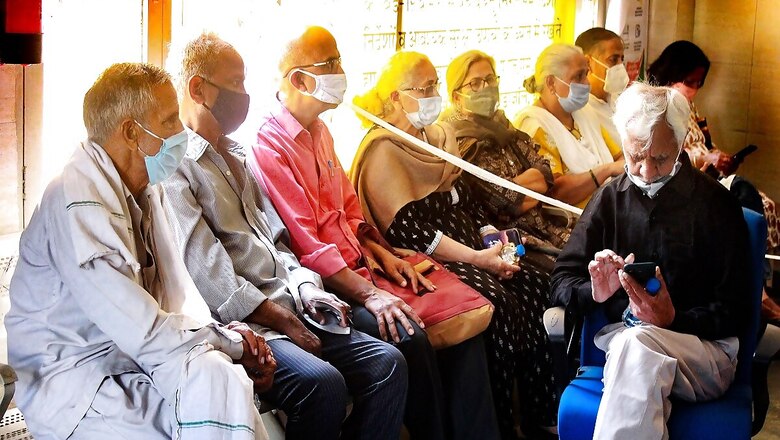
views
India and South Africa have approached the World Trade Organization (WTO) to temporarily suspend Intellectual Property Rights (IPR) for the available COVID-19 vaccines in order to increase accessibility and make the fight against this pandemic more effective. While it’s easy to dismiss this as yet another socialist grandstanding attempt; if properly implemented, this has a solid logic that should help the fight against COVID as well as keep the markets healthy and happy.
Patents are a double-edged sword. On one hand, they incentivise innovation and on the other, they severely constrict further innovation. The earliest example of how disastrous patents can be starts with the Wright Brothers –Orville & Wilbur—who pioneered powered flight in the United States. Almost simultaneously (some say earlier) in France, noted French-Brazilian aviator Alberto Santos-Dumont had also demonstrated powered flight. The Wright brothers however wrapped up all their innovations in patents, while Santos-Dumont did not. Eleven years later, when World War I broke out, the results were evident to everyone. Hobbled by patents, America did not have a functional combat aircraft, with American aviation having completely ossified because of the Wright Brothers monopoly, while across the Atlantic, the French were producing superlative planes far more advanced than anything the Americans had seen or flown. It was keeping this exact example in mind that when Sir Frank Whittle invented the jet engine (simultaneously with Hans von Ohain in Germany) during World War 2, he was not allowed to patent it so that the allies could disseminate and develop the technology faster and better than the Germans.
The clearest modern-day example of this similar pattern is the iPhone, where prior to Samsung’s entry into the market, Apple had been very lax with its patents and its first few iPhone generations saw massive technology leaps. However, the moment Samsung entered the market propelling new innovation, Apple clammed up and threw a whole host of IPR-related litigation at Samsung in order to preserve market space. The results showed, and Apple’s technology leaps started getting slower and slower to the point that they are now an object of ridicule for android users and Samsung advertisements.
ALSO READ | Has India Failed in Detecting the Double Mutant Covid Spread?
This brings us to COVID-19 and the desperate need to temporarily suspend IPRs. There are many arguments in favour of this, even setting aside the rationale that emergency situations require emergency measures. The first and most important result of a temporary IPR suspension would be a significant increase in the production pool of the vaccines. Given the need for large-scale vaccination in order to create some form of herd immunity, time is of the essence. While the term “herd immunity” is used very loosely here, whatever temporary relief it gives is important in reducing the burden on overstressed or broken health services, significantly improving response capacity for dealing with the emerging newer and deadlier strains of the virus. This is purely a health logistics issue.
What is more important is the rapidity of the virus’ mutation. Rapid mutation requires a disaggregated, countermeasure approach, where several regional variations require a much more rapid development and response time in terms of vaccine. This cannot happen with the parent vaccine pools concentrated in a few hands. Rather, much like the French approach in WW1 and British approach in WW2 to aircraft patents, it needs that other critical element of the market economy— competition—to flourish.
Right now what we’re seeing in the guise of IPR protections is essentially anti-competitive behaviour. Indeed, if we look at the path of technology from 1990s onwards, it is small accretions of technology made by the micro, small and medium enterprises (MSMEs) that have synergistically produced greater leaps than the big leaps of giant conglomerates.
The other important issue to consider here is the opportunity cost. Governments and trade organisations have a duty to protect economies and trade as a whole, not just the interests of one sector. Given the cataclysmic drop in business and trade due to lockdowns, the undeniable rights of the pharmaceutical sector have to be weighed against the equally undeniable rights of the rest of the economy. This then is a no-brainer.
ALSO READ | India Racing Against Time, Needs to Open Up Vaccines for Young, Mobile Workforce: Kiran Mazumdar-Shaw
The question is, what can be done to protect the rights of the big pharmaceutical companies? We should be clear about this—that emergencies cannot be a ground to completely negate the principles of IPR developed over decades. The first protection that must be afforded to innovators is that temporary suspension of IPRs must be linked to say 10 years of compulsory royalties, especially on derivatives. This would ensure that the threshold for breaching IPR (2-5 per cent variation on the original at which point it is classified as a new product not bound by IPR) is also relaxed for a period of time deemed suitable based on WTO opportunity cost calculations. To remember here, unlike polio, this is not a lifelong vaccine; however, the market for COVID vaccines will remain for some time.
Given all this, we have a clear choice in front of us. If the currently untenable situation continues, it is only a matter of time before countries start invoking national security and unilaterally breaching patents. In order to protect the global order and the economy, it is better the WTO accepts a temporary and caveated breach of principles than risking a complete and catastrophic breakdown of the system.
Read all the Latest News, Breaking News and Coronavirus News here. Follow us on Facebook, Twitter and Telegram.




















Comments
0 comment